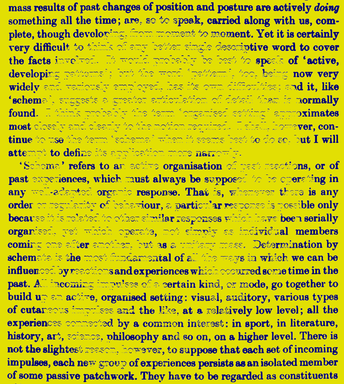Frederic Charles Bartlett1886–1969
Bartlett approached memory from a cognitive viewpoint. He rejected the use of Ebbinghaus’s nonsense syllables and employed meaningful stories or pictures in order to discover how they were remembered and recalled. He developed the method of serial reproduction in which subjects were presented with stories and then recalled them at intervals. He found that unfamiliar material was selectively recalled according to the past experiences of the subject. He referred to this as an “effort after meaning” and used Head’s concept of schema to reflect the organization of memory, as is shown in the text bearing his portrait. His research on memory was presented in Remembering: A Study in Experimental and Social Psychology (1932), and he concluded that: “Remembering is not the re-excitation of innumerable fixed, lifeless, and fragmentary traces. It is an imaginative reconstruction, or construction, built out of the relation of our attitude towards a whole active mass of past experience”. The neurologist Henry Head had introduced the concept of a schema in the context of his research with aphasic patients; it referred to a labile internal representation of past experiences. Bartlett rejected associationist models of memory and his cognitive theory provided a middle road between those of the molecular behaviourists and molar Gestaltists. He can be seen as ushering in the cognitive revolution that was eventually to replace behaviourism, although his work was neglected in America until the 1950s. Bartlett analyzed perception and thought as skilled activities, and he related most cognitive functions to tasks in the real world, seeing little distinction between experimental and applied psychology. “The essential requirement of any performance that can be called skilled becomes much more plain if we look at a few actual instances. The player in a quick ball game; the operator, engaged at his work bench, directing his machine, and using his tools; the surgeon conducting an operation; the physician arriving at a clinical decision - in all these instances and in innumerable others that could just as well be used, there is a continuing flow from signals occurring outside the performer and interpreted by him to actions carried out.. From beginning to end the signals and their related actions form a series, not simply a succession.” Bartlett was born in Stow-on-the-Wold, Gloucestershire. He obtained degrees from the Universities of London and then Cambridge, where he became the first professor of experimental psychology in 1931. His main influences were the psychological philosopher James Ward (1843-1925) and the anthropologist William Halse Rivers Rivers (1864-1922), who together founded the British Journal of Psychology in 1904; Bartlett was the editor from 1924-1948. Bartlett’s influence on British psychology was enormous, not only in terms of providing it with a cognitive orientation but also in training those who were to direct it, for psychology departments came late to the conservative academic institutions of Britain.
